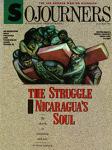It had been a particularly hectic day at the Sojourners office, and that evening my husband, Jim, and I were enjoying the simple comfort of our apartment and some conversation to the quiet background music of Anita Baker. The peaceful interlude was rudely interrupted by a squeal of tires outside, a crash of metal, and the sounds of a car racing away.
Before long, a young Salvadoran came out of the apartment building across the street to survey the damage to his small parked car. A huge dent ran along one side, and the door on the driver's side would not open. As his friends came out and gathered around, Jim went out to see what he could do.
"Have you called the police?" he asked. The young Salvadoran immediately said, "No police, no police!" When Jim expressed his regret about the senseless damage, the young man said sadly, "It's OK." There was no recourse for a young man labeled "illegal" in a city whose police department is overwhelmed with more urgent problems to solve.
He was luckier than a car owner a block away on Euclid Street. One night the previous week, someone opened fire with an automatic weapon on his car, reducing its windows to a pile of shattered glass. More senseless damage on streets that have become increasingly mean.
It is the first week of March as I write this, and already this year our city has experienced 100 murders--more than one a day. We are left with poignant images from the 11 o'clock news: hospital emergency room personnel beside themselves with despair and exhaustion; smiling snapshots of now-dead children; a mother wailing, "He was my baby," as another body is wheeled away; children unable to grasp the loss of their friends.
It has all come suddenly close to home. When a young man opened fire on students at a local high school, the son of a man active in our neighborhood tenants union was among the wounded. When two men crazed on drugs took hostages at a nearby housing project, one of the victims was an elderly woman who came regularly through our food line at the Sojourners Neighborhood Center; she was killed by her captors.
THEY CALL THESE STREETS a "transitional neighborhood." Low-income black residents have lived here for decades. Some landlords have become anxious to fill their buildings with refugees from Central America--who, being "illegal," have no rights and will not organize against doors without locks, garbage that never gets picked up, and apartments without heat. Both groups are at risk as rental properties are disappearing and evictions are paving the way for "urban redevelopment." Three houses on the next block are selling for a quarter of a million dollars each.
When you compound the housing crisis with massive unemployment and an equally massive influx of illegal drugs, you have all the ingredients of a war zone; and the casualties are mounting by the day. Local news anchors are calling what we're living under a "state of emergency," and foreign journalists have compared covering Washington, D.C., to their assignments in places they describe as "under terror." Police have recently been issued semi-automatic weapons to try to match the lethal force of the drug dealers. The nation's capital has earned a new distinction: the "murder capital" of America.
Children 8 and 9 years old play on our streets with "beepers" hooked to their belts, awaiting signals from the dealers when illegal drugs are ready to be run to neighborhood houses. A 16-year-old caught selling drugs and sent to a rehabilitation program says in a television interview that she would sell drugs again: "Why work at McDonald's and get a few dollars when you can get a lot of money this way?"
Our neighborhood is plagued by all the problems that run rampant in places where jobs and money and power and hope are scarce. It is a place that feels abandoned by a city administration run by skewed priorities and tainted by corruption.
At our most recent Sojourners Lenten worship, we heard stories from one another. A lawyer talked about the despair of almost daily running up against an unresponsive city housing administration; a medical technician already swamped in her work with AIDS patients warned of another epidemic that will hit this town as a venereal disease clinic had just been shut down; and a nutritionist shared the pain of working with 250 patients in a city mental institution who face being put out of the mismanaged facility that has been their home for years.
As different members of Sojourners Community shared that night, I saw an image of us desperately plugging small fingers into a dike about to be overwhelmed by a raging flood. For all those who stand on the front lines of this seemingly lost battle--where the sirens of police cars and ambulances and the anguished cries of the abandoned have become life's daily background music--we offer our solidarity and prayers. And we ask for yours as this war wears on.
Joyce Hollyday was associate editor of Sojourners when this article appeared.

Got something to say about what you're reading? We value your feedback!
